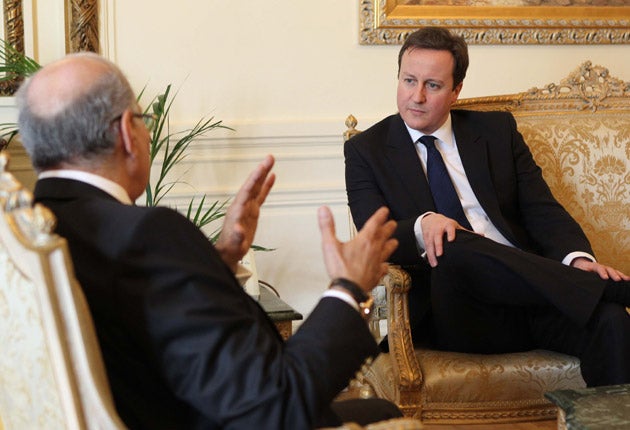Cameron urges reform on Middle East tour

David Cameron voiced "cautious optimism" today that the popular uprisings sweeping the Middle East would not see the rise of extremism while stressing that the outcome was vital to the UK's trade and security interests.
In a rare speech at the Kuwaiti parliament by a visiting foreign leader, the Prime Minister said the region was the "epicentre of momentous change".
He again condemned the "appalling violence" which Libyan leader Colonel Muammar Gaddafi has unleashed against his own people while praising the bravery of the protesters seeking to assert their rights.
"History is sweeping through your neighbourhood," he said.
"Not as a result of force and violence, but by people seeking their rights, and in the vast majority of cases doing so peacefully and bravely. Across the Arab world, aspirations are stirring which have lain dormant.
"It is too early to say how things will turn out. Too often, in the past, there has been disappointment. But there are some grounds for cautious optimism.
"Optimism, because it is the people - especially the young people - who are speaking up. It is they who are choosing to write their history - and doing so for the most part peacefully and with dignity."
Following his visit yesterday to Egypt, where demonstrators toppled the 30-year regime of Hosni Mubarak, Mr Cameron said that politics in the region had too often been seen as a "false choice" between repression and extremism.
He said Western countries needed to understand that it was in their own interests to see basic rights established in the region.
"For decades, some have argued that stability required highly controlling regimes, and that reform and openness would put that stability at risk," he said.
"So, the argument went, countries like Britain faced a choice between our interests and our values. And to be honest, we should acknowledge that sometimes we have made such calculations in the past.
"But I say that is a false choice. As recent events have confirmed, denying people their basic rights does not preserve stability, rather the reverse.
"Our interests lie in upholding our values - in insisting on the right to peaceful protest, in freedom of speech and the internet, in freedom of assembly and the rule of law."
The Prime Minister rejected the so-called "Arab exception" - the argument that Arab or Muslim countries "can't do democracy".
"For me, that's a prejudice that borders on racism," he said.
The recent turbulence has forced Mr Cameron to shift the emphasis of his foreign policy agenda away from what he has called a "messianic" push to bolster trade towards political reform.
But, with 36 business leaders accompanying him on the trip, he insisted that the two - along with security - are closely linked.
"Yes, ours is a partnership based on a shared economic future as we need our economies to grow and diversify in this challenging globalised world," he said.
"And yes, ours is a partnership to deliver shared security interests, not least as we confront the terrorist threat we face from extremists.
"But crucially, far from running counter to these vital interests of prosperity and security, I believe that political and economic reform in the Arab world is essential, not just in advancing these vital shared interests but as a long-term guarantor of the stability needed for both our societies to flourish."
Earlier, Mr Cameron attended a ceremony to mark the 20th anniversary of the liberation of Kuwait by international forces in the first Gulf War following the invasion by the Iraqi dictator Saddam Hussein.
He was joined by the then prime minister Sir John Major and the Kuwaiti prime minister Sheikh Nasser al Mohammed al Ahmed al Jabber al Sabah, as well as veterans of the conflict.
The Prime Minister paid tribute to the 47 British troops who died, saying: "Their sacrifice is honoured not just today, but every day by all Kuwait have achieved as a nation and by all you will achieve in the future."
Join our commenting forum
Join thought-provoking conversations, follow other Independent readers and see their replies
Comments
Bookmark popover
Removed from bookmarks